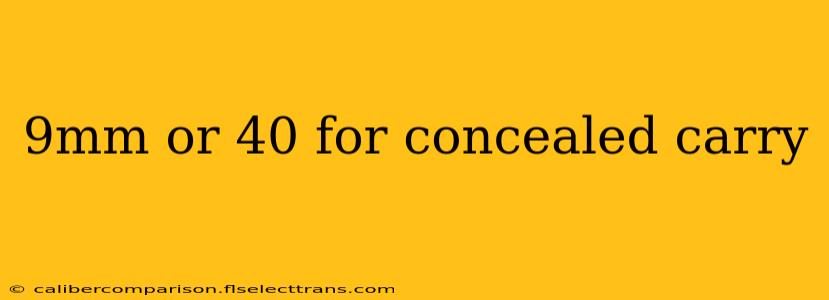Choosing a caliber for concealed carry is a deeply personal decision, and the 9mm vs .40 S&W debate is a classic example. Both cartridges have passionate advocates, and understanding the nuances of each is crucial before making your choice. This article dives deep into the ballistics, recoil, capacity, and overall suitability of each round for concealed carry, helping you determine which is best for you.
Ballistics: Power and Penetration
Let's start with the raw power. The .40 S&W generally boasts a higher muzzle energy and heavier bullet weight than the 9mm. This translates to potentially greater stopping power, especially at longer ranges. However, the difference isn't as dramatic as some believe. Modern 9mm ammunition, particularly those with jacketed hollow points (JHPs), offers exceptional stopping power within typical self-defense ranges.
- .40 S&W: Higher muzzle energy, potentially greater penetration, but potentially more overpenetration in certain situations.
- 9mm: Lighter recoil, higher capacity, good stopping power with modern JHP ammunition.
The Verdict: While the .40 S&W might offer a slight edge in raw power, the advancements in 9mm ammunition significantly minimize this advantage.
Penetration and Overpenetration: A Crucial Consideration
Overpenetration is a significant concern in any self-defense scenario. A bullet that passes through the target and continues into a wall or another person poses a substantial risk. While the .40 S&W's higher energy can contribute to overpenetration, proper ammunition selection (JHPs designed for expansion and controlled penetration) significantly mitigates this risk in both calibers.
Recoil and Shootability
This is where the 9mm often pulls ahead. The lighter recoil of the 9mm makes it significantly easier to shoot accurately, especially in stressful situations. Rapid follow-up shots are much easier to execute with less felt recoil, a critical factor in a self-defense encounter. The .40 S&W, on the other hand, can be snappy and difficult to control, particularly for smaller-framed individuals or those new to firearms.
- .40 S&W: More significant recoil, potentially impacting accuracy and follow-up shots.
- 9mm: Lighter recoil, promoting better accuracy and faster target acquisition.
The Verdict: For concealed carry, where quick, accurate shots are paramount, the 9mm's manageable recoil gives it a clear advantage.
Capacity: More Rounds, More Chances
Magazine capacity plays a significant role in concealed carry. Because of its smaller size, the 9mm generally offers higher magazine capacity in similarly sized handguns. This translates to more rounds available in a self-defense situation.
- .40 S&W: Lower magazine capacity in comparable firearms.
- 9mm: Higher magazine capacity, offering more shots if needed.
The Verdict: The increased capacity of the 9mm provides a considerable advantage in a potential self-defense scenario.
Concealability: Size and Weight
Both calibers are viable for concealed carry, but the overall size and weight of the firearm can vary significantly. While some .40 S&W handguns are surprisingly compact, you'll often find that comparable 9mm handguns are slightly smaller and lighter—making them easier to conceal. This is especially important for all-day carry.
- .40 S&W: Can be bulky, potentially impacting comfort and concealability.
- 9mm: Generally offers more compact and lighter options for concealed carry.
The Verdict: The typically smaller size and lighter weight of 9mm handguns make them generally more comfortable and easier to conceal for extended periods.
The Final Verdict: Which Caliber Wins?
For concealed carry, the 9mm generally emerges as the superior choice. Its manageable recoil, higher capacity, and generally smaller and lighter firearm options make it better suited for the demands of self-defense in a concealed carry context. While the .40 S&W offers slightly more raw power, the advancements in 9mm ammunition and the practical advantages of reduced recoil and increased capacity often outweigh this difference.
However, the "best" caliber is subjective. Consider your physical characteristics, experience level, and comfort with each caliber before making a decision. Always practice extensively with your chosen firearm and ammunition to ensure proficiency and confidence. Consult with experienced shooters and firearms instructors to refine your choice. Your safety and proficiency are paramount.

